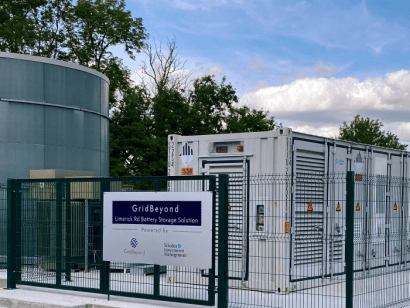
The battery will also participate in grid capacity and DS3 grid services where it helps balance the grid Frequency at 50Hz as well as feedback energy to the grid when supply is low.
The BESS will also allow CareyGlass to store energy from periods when the grid mix has a lower concentration of carbon and dissipating that energy to the site at peak hours of consumption, supporting the grid to reduce carbon emitting generation at those peak periods thereby reducing the carbon intensity of the power system.
GridBeyond will manage the flexibility of the site by connecting the batteries to its AI-powered energy technology platform, GridBeyond Point. The flexibility of the hub also enables the Grid to integrate more renewable energy sources onto the electricity network, whilst reducing the carbon footprint of the power grid.
As one of Europe's largest glass processing companies CareyGlass provides solutions and products that contribute to stunning architectural buildings around the world. While the products they produce are sustainable in their own right by reducing the requirement for electricity to light, heat and to cool buildings, CareyGlass takes a holistic approach and have engaged in an ambitious energy plan by implementing sustainability along its entire value chain.
Denver Blemings, GridBeyond Regional Director for Ireland, commented, "We are extremely proud of working together with CareyGlass. As we move away from fossils fuels, energy storage batteries are a great asset, which can provide more resilience, mitigate risk of power interruption and deliver a great value for the businesses in term of savings and carbon reduction."
Roberta Delaney, CFO at CareyGlass commented, "At CareyGlass we recognize that there is a business imperative for addressing the climate change crises head on. We view sustainability as an investment in the future, it has become part of the very core of our company and an integral part of our day to day lives."
Ireland is an advanced market for energy storage compared to its size and as BESS projects expand, these will help to integrate more renewables into the grid and help the country to reach 70% of renewable energy by 2030.

